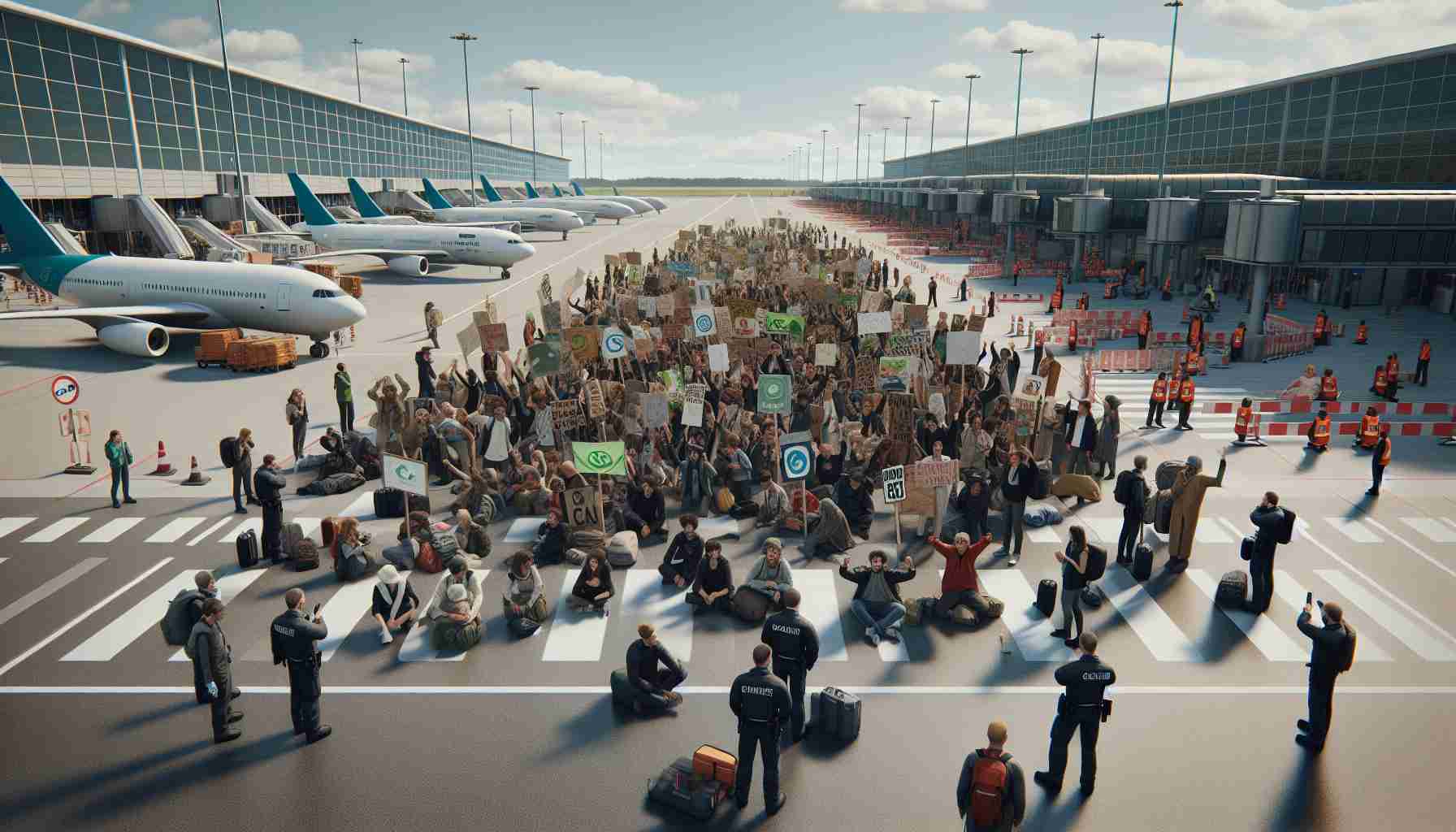Climate activists in Germany caused chaos at the country’s airports, sparking calls for improved security protocols. The disruptive actions led to flight delays and raised concerns about the vulnerability of airport facilities.
The activists managed to breach airport perimeters, halting air traffic operations for consecutive days. German officials condemned the blockades as reckless and unlawful, urging stricter measures to prevent such incidents in the future.
In response to the disruptions, the German Interior Minister emphasized the need for enhanced security measures, proposing harsh penalties for unauthorized access to airfields. The incidents at Frankfurt airport, the country’s busiest airport, highlighted the importance of safeguarding critical infrastructure against intrusions.
Passengers affected by the disruptions expressed frustration, questioning the effectiveness of the activists’ methods in conveying their message. Despite the activists’ pledge to escalate their campaign against fossil fuels, authorities vowed to thwart future attempts at disrupting airport operations.
The call for better protection of airports reverberated across Europe, signaling a unified effort to bolster security measures and prevent similar incidents in the future. The focus is now on implementing advanced security technologies and strategies to safeguard critical transportation hubs from potential disruptions.
Climate Activists Disrupt German Airports: Unveiling Unreported Realities and Unresolved Issues
As the chaos caused by climate activists at German airports continues to make headlines, key questions emerge regarding the implications, challenges, and controversies surrounding these disruptions. Let’s delve into some crucial aspects that have not been covered in previous reports:
What are the key motivations driving climate activists to target airports?
Climate activists view airports as emblematic symbols of carbon-intensive transportation and the broader issue of climate change. By disrupting airport operations, they seek to draw attention to the urgent need for society to transition to more sustainable modes of travel to reduce greenhouse gas emissions.
What are the potential security vulnerabilities exposed by these incidents?
The ability of activists to breach airport perimeters and disrupt flight schedules raises concerns about the adequacy of current security protocols. It underscores the challenges faced by authorities in balancing security measures with ensuring the smooth flow of air travel. Addressing these vulnerabilities necessitates a comprehensive reassessment of security strategies and technologies.
What are the advantages and disadvantages of the heightened security measures proposed in response to the disruptions?
Enhanced security measures, such as imposing harsh penalties for unauthorized access to airfields, can deter future disruptions and send a strong message against unlawful actions. However, the implementation of stringent measures may also restrict legitimate protests and impede the civil liberties of individuals expressing dissent. Striking a balance between security and democratic rights remains a critical issue.
Key Challenges and Controversies:
One of the primary challenges associated with the airport disruptions is the potential escalation of tensions between authorities and activists, leading to a cycle of protest and security crackdowns. The controversies arise from the diverging perspectives on the legitimacy of disruptive activism as a means to advance climate goals, with some advocating for more dialogue-based approaches.
In conclusion, while the calls for enhanced security at airports resonate with the imperative to safeguard critical infrastructure, unresolved questions persist regarding the balancing of security, civil liberties, and environmental activism. Addressing these complex issues requires a nuanced and multifaceted approach that considers the diverse stakeholders involved.
For further insights on airport security and the intersection of climate activism with transportation infrastructure, visit BBC News.
 The Rise and Fall of BigBear.ai: Is AI Innovation Enough to Overcome Financial Storms?
The Rise and Fall of BigBear.ai: Is AI Innovation Enough to Overcome Financial Storms?  Unlocking Secrets: Mario Kart World’s Vast Exploration Surprises Fans
Unlocking Secrets: Mario Kart World’s Vast Exploration Surprises Fans  Why Your Electric Car Might Last Much Longer Than You Think
Why Your Electric Car Might Last Much Longer Than You Think  How General Dynamics Surged While Investors Bet Big on Defense
How General Dynamics Surged While Investors Bet Big on Defense  The Art Professor Bound for Space: A Galactic Journey with Virgin’s Visionary
The Art Professor Bound for Space: A Galactic Journey with Virgin’s Visionary  Ingenious Betrayal: Two Faces of Innovation at Qualcomm
Ingenious Betrayal: Two Faces of Innovation at Qualcomm  Asteroid 2024 YR4: A Cosmic Puck Heading Toward the Moon?
Asteroid 2024 YR4: A Cosmic Puck Heading Toward the Moon?  Unmasking the “Pig Butchering” Scam: How Sophisticated Schemes Fleeced Millions in Cryptocurrency
Unmasking the “Pig Butchering” Scam: How Sophisticated Schemes Fleeced Millions in Cryptocurrency  The Shocking Market Plunge That Shocked the World: What Really Happened?
The Shocking Market Plunge That Shocked the World: What Really Happened? 